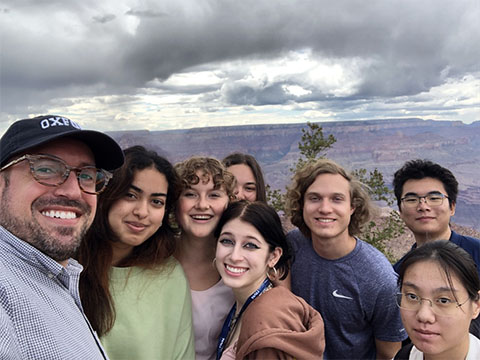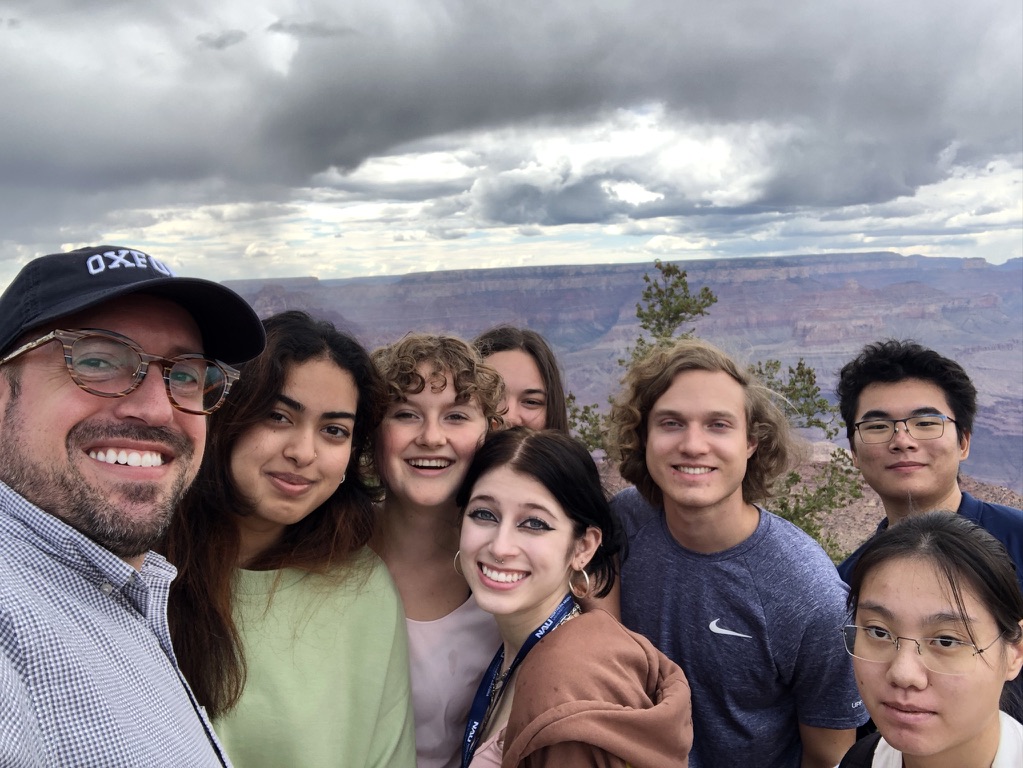Oxford students share research at linguistics conference in Arizona

Linguistics professor Jack Hardy led a group of seven current and former students to present their research at the 2022 American Association for Corpus Linguistics Conference held in Flagstaff, Arizona.
Taking his research on the road to academic conferences is nothing new for Oxford Assistant Professor of Linguistics Jack Hardy, but this year, he brought along something special: seven of his current and former students.
Every other year, the American Association for Corpus Linguistics Conference brings together scholars to discuss the latest work and advancements in the field. This year, Hardy's students joined him at the conference, hosted by Northern Arizona University. The students presented their own research—a rare opportunity for most undergraduates. For these students—five currently at Oxford and two now at Emory College—this was a first look at the world of professional academia, networking, and conferences.

"I think it's great for undergrads to be at something like this—not at an undergrad conference, but at a professional conference of working academics," Hardy said. "They were able to meet the actual people who wrote what they had read and then were able to approach them and network and make connections."
Oxford students Janelle Cai, Matthew Lin, Rose Delony, Lydia King, and Mrudhula Nithiyakumar, along with Emory College juniors Kristen Gram and Kevin Hoffman, each gave presentations. King, Delony, and Nithiyakumar gave a joint talk on Oxford's own Milestone program—a final step of the Oxford curriculum where students reflect on the connections and impact of their academic work on their lives—and "the language of undergraduate reflection." The other four students gave poster presentations. After the conference, the group enjoyed a visit to the Grand Canyon.
"I was over-the-moon about their presentations," Hardy said. "Afterwards, lots of people came up to me and were impressed that students were doing this in their first or second year."
King, part of the team that examined the language students used in their Milestone projects, said she had "an incredible experience" and left the conference inspired.
"Going to a linguistics conference and the Grand Canyon with a professor feels like something straight out of an Oxford tour guide script," King said. "It was also a really unique experience to bond with fellow students.… I knew I was interested in linguistics before the trip, but the conference definitely validated my academic interest."
Hardy, who worked closely with the students in developing their research topics and proposals, guided them conceptually, but also noted how much they brought their own expertise and ownership to the research. For example, they applied their diverse cultural knowledge to discussions of feminism on Chinese social media and how different languages in Western European countries approached secession movements (such as Catalonia's referendum on whether to remain part of Spain in 2017).
Looking back at the trip, Hardy commended Kristin Bonnie, Senior Associate Dean of Academic Affairs—and her predecessor, Dean Ken Anderson—for arranging funds and supporting his students.
"It's awesome to work somewhere where investment [in student research] is valued," he said. "The way that I want to continue my own scholarship is involving students. This has been my strategy—to do these empirical projects that might not be published in a big journal, but that will give [students] opportunities to interact with academia in a way most undergraduates don't."
Taking his research on the road to academic conferences is nothing new for Oxford Assistant Professor of Linguistics Jack Hardy, but this year, he brought along something special: seven of his current and former students.
Every other year, the American Association for Corpus Linguistics Conference brings together scholars to discuss the latest work and advancements in the field. This year, Hardy’s students joined him at the conference, hosted by Northern Arizona University. The students presented their own research—a rare opportunity for most undergraduates. For these students—five currently at Oxford and two now at Emory College—this was a first look at the world of professional academia, networking, and conferences.

Oxford students Janelle Cai, Matthew Lin, Rose Delony, Lydia King, and Mrudhula Nithiyakumar, along with Emory College juniors Kristen Gram and Kevin Hoffman, each gave presentations. King, Delony, and Nithiyakumar gave a joint talk on Oxford’s own Milestone program—a final step of the Oxford curriculum where students reflect on the connections and impact of their academic work on their lives—and “the language of undergraduate reflection.” The other four students gave poster presentations. After the conference, the group enjoyed a visit to the Grand Canyon.
“I was over-the-moon about their presentations,” Hardy said. “Afterwards, lots of people came up to me and were impressed that students were doing this in their first or second year.”
King, part of the team that examined the language students used in their Milestone projects, said she had “an incredible experience” and left the conference inspired.
“Going to a linguistics conference and the Grand Canyon with a professor feels like something straight out of an Oxford tour guide script,” King said. “It was also a really unique experience to bond with fellow students.… I knew I was interested in linguistics before the trip, but the conference definitely validated my academic interest.”
Hardy, who worked closely with the students in developing their research topics and proposals, guided them conceptually, but also noted how much they brought their own expertise and ownership to the research. For example, they applied their diverse cultural knowledge to discussions of feminism on Chinese social media and how different languages in Western European countries approached secession movements (such as Catalonia’s referendum on whether to remain part of Spain in 2017).
Looking back at the trip, Hardy commended Kristin Bonnie, Senior Associate Dean of Academic Affairs—and her predecessor, Dean Ken Anderson—for arranging funds and supporting his students.
“It’s awesome to work somewhere where investment [in student research] is valued,” he said. “The way that I want to continue my own scholarship is involving students. This has been my strategy—to do these empirical projects that might not be published in a big journal, but that will give [students] opportunities to interact with academia in a way most undergraduates don’t.”